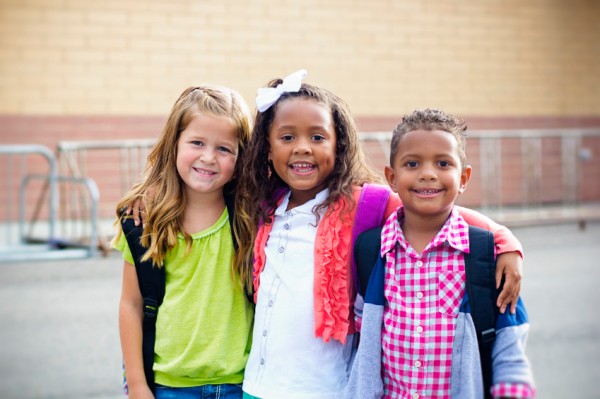
Learning to make friends is one of the most important skills your child can learn that will benefit him throughout his entire life. Having close friends has been known to help people live longer, happier lives, as well as become more successful at school and work.
Not all children are innately socially adept; some children who may be shy or have behavioral challenges such as ADHD may need additional assistance in learning age-appropriate social skills. However, all children can benefit from their parents guiding them in the friendship department.
There are some key techniques you can use with your children to help them make friends, even from a very young age.
- Teach simple, daily social greetings. If you have a toddler or preschooler, you can teach your child about kindness by practicing simple daily interactions. You can ask your toddler to practice saying hello and goodbye, with a smile, to others as you are out and about at the grocery store or at the park.
- One-on-one playdates are important. Invite one of the neighborhood kids over to your house for an afternoon of arts and crafts, playing dolls, or playing in the backyard. Take a trip to the library or museum with your child and invite a mom friend and her child of a similar age to join you. One-on-one playdates are the best opportunities for bonding and shared experiences that your child can build on when they go to school.
- Teach children how to have conversations that lead to connections. When my children were young, I would give them icebreakers before we would enter social situations. They learned to ask questions such as “What’s your favorite color?” or “What type of books do you like to read?” This helped them from a young age make connections with others through shared interests and experiences. It also taught them the importance of being a good listener.
- Help your children find group activities that interest them. Does your child like to sing or paint? Is your child really into sports? Help them by engaging them in clubs and activities with others who share their interests. Children like “sameness,” and while you don’t need to teach them to be followers, you can help them feel comfortable by leading them to situations where they have the opportunity to interact with other children who have similar likes and dislikes.
- If you have a particularly anxious child, always listen and observe them very carefully. Give this child more time to rehearse and practice what they might say in social situations. Practicing and rehearsing social skills in a safe and warm environment, such as home, will support your child by teaching him social cues, as well as age-appropriate social skills practices. Also, impulse control and empathy can be taught to children. These strategies can help your child relate to his peers in a positive way.
- Be what you want to see. Modeling good social behavior yourself, of course, is one of the best ways to teach by example. Show your child how you warmly greet friends, how you empathize with them when they are dealing with a difficult situation, how you ask questions and listen carefully to their answers, and emphasize the importance these friends have in your life.
- Keep in mind that children will make mistakes socially because they are still immature and don’t understand. There’s nothing wrong with your child, he just needs to be taught social skills and problem solving on a regular basis until he can fully understand.
You have to know how to be a friend in order to have a friend. As parents, we can help our children understand what it is to be a friend. It is our job to teach them about the importance of relationships rather than keeping them isolated, so that they can learn to build meaningful friendships throughout their lifetime.

